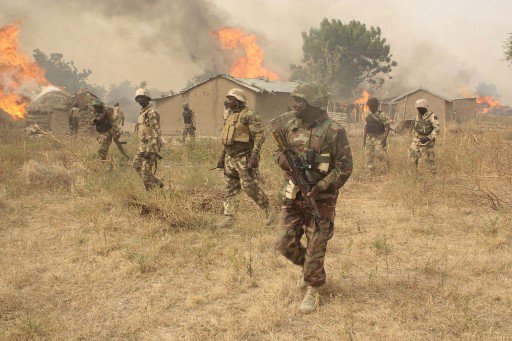
One terror group killed nearly 11,000 people in 2015 — and it wasn't ISIS.
While the Sunni militants in Syria and Iraq dominated the headlines in 2015, Boko Haram was killing more people than ever — potentially eclipsing the tally of its partner in terror.
Nigeria's new government pledged to oust Boko
Haram and has boasted of successfully retaking territory from the
extremists, but experts warn this might merely have forced the group to
change tactics and possibly prompted a higher civilian casualty toll.
How bad is it?
ISIS has continued its campaign of terror and was linked to attacks in Paris, Yemen, Saudia Arabia, Kuwait, Libya and elsewhere.
The bloodshed has dominated international
attention — from headlines to halls of power — all while thousands have
silently been slaughtered at the hands of Boko Haram.
Nigeria's militant group — which has pledged allegiance to ISIS — has been tied to nearly 11,000 killings in 2015 as of mid-December, according to the Council on Foreign Relations.
More than half of the deaths — around 6,500 —
have been the direct result of Boko Haram's suicide bombings and armed
raids. The rest died as a result of fighting between the militants and
Nigerian troops, according to CFR's data.
With details and information from Boko Haram's
heartland in northeast Nigeria hard to come by, most experts believe the
true tally of the violence has been even higher and could still climb
before the year's end.
"Sadly they have a history of attacks around
Christmas and New Year," said Dr. J. Peter Pham, director of the Africa
Center at the Washington-based Atlantic Council.
That could put Boko Haram on track to surpass
last year's brutal toll and claim the mantle of deadliest terror group
for a second year running. Recent findings from the Institute for Economics and Peace, a Sydney-based think tank, showed that Boko Haram was the deadliest terror group in the world last year. ISIS came in second.
Between them, Boko Haram and ISIS accounted for more than half of the world's terrorism-related deaths in 2014, according to the Institute's Global Terrorism Index published in November.
How did we get here?
Boko Haram started off the year with a bang.
After slipping from the headlines as attention faded on the mass
kidnapping which sparked the #BringBackOurGirls campaign, Boko Haram
mounted a massive attack in January on the fishing village of Baga.
Satellite images and eyewitness accounts told of a merciless assault
in which Boko Haram fighters gunned down children and pregnant women
who were not able to escape fast enough into the bush. Estimates of the
death toll there ranged from over 100 to 2,000 killed.
That attack — and the prospect of an impending
presidential election — sparked renewed government efforts to take on
the militants and drive them from their strongholds.
Boko Haram pledged allegiance to ISIS on March 7
— three weeks before the election — and once Muhammadu Buhari won the
presidency, he pledged to defeat the militants by the end of the year.
What has the new Nigerian government done?
This "very ambitious target" showed a "sense of
renewed effort … energy and focus" by the Nigerian state, according to
Elizabeth Donnelly, assistant head and research fellow of the Africa
program at the London-based Chatham House think tank.
Nigerian troops — aided by its neighbors Chad,
Niger and Cameroon — picked up where the previous administration left
off in an attempt to rout the militants from their areas of control.
However, the attacks on Nigeria and its
neighbors kept coming. Some experts say that's because the crackdown
forced Boko Haram to adapt rather than crumble.
"Certainly the threat has not gone away," said
Donnelly. "It does seem that there has been a ratcheting up of attacks
against civilians … This might be because of the pressure coming from
the Nigerian armed forces."
Boko Haram appears to have reverted to the
hit-and-run-style warfare it employed before focusing on territorial
gains and the building of its caliphate last year.
The Atlantic Council's Pham said any territorial
gains made by the military might be illusory and that Boko Haram's
military tactics also appear to have grown more sophisticated.
For example, he said, it appears Boko Haram has
learned to leave open an escape route when besieging a town and set
booby traps for the fleeing government troops.
With no sign of Boko Haram slowing down,
newly-elected President Buhari appears to have softened his pledge.
Earlier this month he said that initial deadline — cripple the militants
by years end — was only meant to "serve as a guide."
ISIS Owns Headlines, but Nigeria's Boko Haram Kills More Than Ever
![ISIS Owns Headlines, but Nigeria's Boko Haram Kills More Than Ever]() Reviewed by Spencer Reports
on
7:19 am
Rating:
Reviewed by Spencer Reports
on
7:19 am
Rating:


No comments: